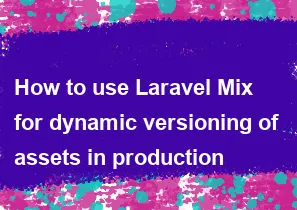How to use Laravel Mix for dynamic versioning of assets in production

Laravel Mix is a powerful tool that simplifies the asset compilation process in Laravel applications. To achieve dynamic versioning of assets in production, you can use the version method provided by Laravel Mix. This method appends a unique hash to the filenames of your compiled assets, allowing you to easily bust the cache when your assets change.
Here's a step-by-step guide on how to use Laravel Mix for dynamic versioning of assets in production:
Install Laravel Mix:
Make sure you have Laravel Mix installed in your Laravel project. If you haven't already, you can install it using:
bashnpm install laravel-mix --save-devConfigure Laravel Mix:
Create a
webpack.mix.jsfile in the root of your Laravel project and configure your asset compilation settings. Here's a basic example:javascriptconst mix = require('laravel-mix'); mix.js('resources/js/app.js', 'public/js') .sass('resources/sass/app.scss', 'public/css') .version();In this example, we are compiling JavaScript and Sass files and applying the
versionmethod to enable dynamic versioning.Run Laravel Mix:
Compile your assets by running the following command:
bashnpm run devFor production, you can use:
bashnpm run productionUpdate Blade Templates:
In your Blade templates, use the
mixhelper function to reference the dynamically versioned asset URLs. For example:html<link rel="stylesheet" href="{{ mix('css/app.css') }}"> <script src="{{ mix('js/app.js') }}"></script>The
mixhelper will automatically replace the asset path with the versioned path.Verify Versioned Assets:
After compiling your assets, check the
public/mix-manifest.jsonfile to ensure that versioning information is present.json{ "/js/app.js": "/js/app.js?id=1234567890", "/css/app.css": "/css/app.css?id=0987654321" }The hash values (e.g.,
1234567890and0987654321) are dynamically generated based on the content of your assets.
That's it! Your assets are now versioned, and the browser will automatically request the new version when changes are made.
For additional information and resources, you can refer to the official Laravel Mix documentation:
These resources provide in-depth information and examples to help you make the most of Laravel Mix in your projects.
=== Happy Coding :)
-
Popular Post
- How to optimize for Google's About This Result feature for local businesses
- How to implement multi-language support in an Express.js application
- How to handle and optimize for changes in mobile search behavior
- How to handle CORS in a Node.js application
- How to use Vue.js with a UI framework (e.g., Vuetify, Element UI)
- How to configure Laravel Telescope for monitoring and profiling API requests
- How to create a command-line tool using the Commander.js library in Node.js
- How to implement code splitting in a React.js application
- How to use the AWS SDK for Node.js to interact with various AWS services
- How to use the Node.js Stream API for efficient data processing
- How to implement a cookie parser middleware in Node.js
- How to implement WebSockets for real-time communication in React
-
Latest Post
- How to implement a dynamic form with dynamic field styling based on user input in Next.js
- How to create a custom hook for handling user interactions with the browser's device motion in Next.js
- How to create a custom hook for handling user interactions with the browser's battery status in Next.js
- How to implement a dynamic form with dynamic field visibility based on user input in Next.js
- How to implement a dynamic form with real-time collaboration features in Next.js
- How to create a custom hook for handling user interactions with the browser's media devices in Next.js
- How to use the useSWRInfinite hook for paginating data with a custom loading indicator in Next.js
- How to create a custom hook for handling user interactions with the browser's network status in Next.js
- How to create a custom hook for handling user interactions with the browser's location in Next.js
- How to implement a dynamic form with multi-language support in Next.js
- How to create a custom hook for handling user interactions with the browser's ambient light sensor in Next.js
- How to use the useHover hook for creating interactive image zoom effects in Next.js